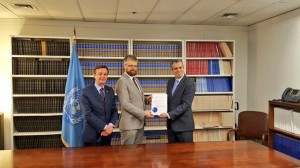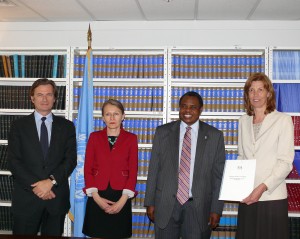Side Event “Review of the Amendments on the Crime of Aggression”: On 8 July 2025, Africa Legal Aid (AFLA) hosted a side event on the review of the amendments on the crime of aggression at the headquarters of the United Nations. AFLA’s Executive Director Evelyn A Ankumah moderated the event. Franz Xaver Perrez, Director General, Directorate of International Law, Federal Department of Foreign Affairs of Switzerland, made the opening statement. Presentations were delivered by Samuel Mbemba Kabuya, Interim Minister of Justice and Keeper of the Seals of the DRC, Dr. Dominic Akuritinga-Ayine, Attorney General and Minister of Justice of Ghana, Edrick Noah, Assistant Minister, Administration and Public Safety, Ministry of Justice of Liberia, and Jennifer Trahan, Convenor of the GIPA. 
Category Archives: Uncategorized
GIPA letter to the ILC on Draft Article 7: On the occasion of the 76th Session of the International Law Commission (ILC) beginning on 28 April 2025, the Global Initiative for the Prevention of Aggression (GIPA) provided brief comments to the ILC on draft article 7 of the draft articles on immunity of State officials from foreign criminal jurisdiction. GIPA explains in its letter why there is no functional immunity from foreign criminal jurisdiction. Leaving the crime of aggression out of the list of crimes to which functional immunities do not attach would result in inconsistency and a risk of double standards. This could potentially fragment international law. For the full comments, see here.
Regional Conferences on Reviewing the Rome Statute: On 10 April 2025, GIPA Council of Adviser Professor Patrycja Grzebyk and Professor Claus Kreß were part of panels presenting during the regional conference in Seoul organized by the German Ministry of Foreign Affairs together with Estonia and Poland. The panels explored the case and the legal options for strengthening the ICC’s jurisdictional regime on the crime of aggression at the Review Conference this year. The meeting is part of the series of regional conferences in Africa, Latin America and Asia entitled “Review of the Rome Statute of the International Criminal Court: Strengthening the Court’s Jurisdiction for the Crime of Aggression.” For videos of the conference, see here.
Joint Civil Society Statement: In light of the upcoming review of the aggression amendments in July 2025, over 40 NGOs signed a joint statement calling on all states parties to take the steps required to amend the International Criminal Court’s jurisdiction over the crime of aggression. It states that “the international community needs…a legal framework that can end impunity and effectively deter state leaderships from waging aggressive wars and other acts of aggression.” This is why “the ICC must be able to prosecute the crime of aggression under the same conditions that exist for the other three core international crimes”. The signatories include, inter alia, the European Center for Constitutional and Human Rights, the Global Institute for the Prevention of Aggression, International Federation for Human Rights (FIDH), Open Society Justice Initiative and Parliamentarians for Global Action. For the full statement, see here.
Discussion Paper for the Mandated Review of the Aggression Amendments: On 8 November 2024, the Permanent Representatives of Costa Rica, Sierra Leone, Vanuatu, Germany and Slovenia sent a discussion paper to all States Parties to the Rome Statute in preparation of the mandated review of the Aggression Amendments in 2025. The discussion paper had previously been elaborated by a cross-regional group of friends and points out two options for how Article 15 bis of the Rome Statute can be revised to bring the Court’s jurisdictional regime over the crime of aggression in line with its jurisdiction over genocide, war crimes and crimes against humanity.
Ukraine will become the 125th State Party to the Rome Statute of the International Criminal Court: On October 25, 2024, Ukraine officially deposited with the United Nations its instrument of ratification of the Rome Statute of the International Criminal Court. Thus, the ratification will take effect on January 1, 2025. This will make Ukraine the 125th State Party to the Rome Statute and the 46th ratifier of the Kampala Amendments on the crime of aggression.

 Memorial of Ben Ferencz and Thomas Buergenthal:
Memorial of Ben Ferencz and Thomas Buergenthal:
On 2 June 2024, Don Ferencz hosted a memorial honoring the legacy of two men with outstanding contributions to international law who died last year: Ben Ferencz, US chief prosecutor in the Einsatzgruppen trial and Professor Emeritus of the Global Institute for the Prevention of Aggression, as well as Thomas Buergenthal, Auschwitz survivor and former judge at the ICJ and the IACtHR. The event took place at the Peace Palace in The Hague and attracted various speakers, from high-level ICL practitioners, such as former ICC Chief Prosecutors Fatou Bensouda and Luis Moreno Ocampo, former ICTY and ICTR prosecutor Richard Goldstone and former US ambassador-at-large for war crimes Stephen Rapp, to ambassadors, such as Christian Wenaweser, and ICL academics, such as David Donat Cattin, Carrie McDougall, Astrid Reisinger Coracini, Leila Sadat, William Schabas, Michael Scharf and Jennifer Trahan.
In memoriam of Ben Ferencz: Our co-founder and one of the most dedicated advocates of the rule of law, especially the crime of aggression, would have turned 104 years old today. We miss him immensely and we are looking forward to celebrating his legacy in Nuremberg and The Hague this year.
Conference “Addressing cyber-related crimes under the Rome Statute system”: Professor Jennifer Trahan, Convenor of The Global Institute for the Prevention of Aggression, was honored to present the findings of the Council of Advisers’ Report on the Application of the Rome Statute of the International Criminal Court to Cyberwarfare” at the International Criminal Court on January 22, 2024. The conference where she spoke was entitled “Addressing cyber-related crimes under the Rome Statute system” and co-sponsored by the International Criminal Court’s Office of the Prosecutor and Microsoft (See ICC OTP Press release).
The meetings of the Council of Advisers that led into the drafting of the report occurred in 2019-2020, while Don Ferencz was Convenor of GIPA. The meetings on which the report is based were hosted by the Permanent Mission of Liechtenstein to the UN, and co-organized by 10 other UN missions. The full report, drafted under the supervision of Liechtenstein legal adviser Sina Alavi, can be found here.
The report makes the case that each of the Rome Statute’s four crimes can be committed partly or fully through cyber, a position now endorsed by the ICC Prosecutor. The report is anticipated to play a role in the formation of the ICC’s future policy paper on the Rome Statute and cyber.
Liechtenstein’s statement at the Sixth Committee: The GIPA welcomes the clear language of Liechtenstein when commenting on the work of the International Law Commission at the UN General Assembly on 23 October 2023. Liechtenstein does not understand why draft article 7 of the ILC’s work on “Immunity of State officials from foreign criminal jurisdiction” leaves out the crime of aggression. In Liechtenstein’s position, “the crime of aggression should have been included” in the list of crimes in respect of which functional immunity does not apply, “especially given it is a leadership crime which requires us to overcome immunities to ensure meaningful accountability and its future prevention.”
For the full statement, see here.
Niger becomes 45th State to ratify Kampala amendments: On 14 April 2023, Niger deposited its instrument of ratification of the Kampala amendments, becoming the 45th State to ratify the amendments on the crime of aggression.
For the video see here.
Nuremberg Declaration on the Crime of Aggression of 8 May 2023: The International Nuremberg Principles Academy following on a thorough deliberation on these matters with leading international law experts adopted a declaration in which it:
“Calls upon the international community to support the establishment of a tribunal to
prosecute crimes of aggression as defined under international law committed on the
territory of Ukraine,
Calls upon States Parties to the Rome Statute of the International Criminal Court to amend the jurisdictional provisions governing the crime of aggression to align them with those applicable to the other crimes within the jurisdiction of the International Criminal Court.”
For the full declaration, see here.
Coalition for International Criminal Justice – States Parties Should Strengthen the ICC’s Ability to Prosecute Aggression: Whilst establishing a special tribunal for the crime of aggression may address the current lacuna with respect to Russia’s attack on Ukraine,a sustainable solution appears to include a reversal of the Kampala compromise. For the full statement see here.
Statement Honoring the Legacy of Benjamin B. Ferencz: The Global Institute for the Prevention of Aggression is deeply saddened to report that the Institute’s co-founder and President Emeritus Benjamin B. Ferencz died on April 7, 2023, at the age of 103. He was a tireless advocate for international criminal justice and the last living prosecutor from the Nuremberg war crimes trials. Only recently, he received a US Congressional Gold Medal in recognition of his service to the United States and the international community.
Ferencz: The Global Institute for the Prevention of Aggression is deeply saddened to report that the Institute’s co-founder and President Emeritus Benjamin B. Ferencz died on April 7, 2023, at the age of 103. He was a tireless advocate for international criminal justice and the last living prosecutor from the Nuremberg war crimes trials. Only recently, he received a US Congressional Gold Medal in recognition of his service to the United States and the international community.
Born on March 11, 1920, in Transylvania, now modern day Romania, he soon fled from anti-Semitic persecution together with his parents and emigrated to the United States. Ben grew up in New York City, and in 1940, was awarded a scholarship to Harvard Law School where he graduated with honors.
After the onset of World War II, Ben enlisted in the United States Army in 1943, and joined an anti-aircraft artillery battalion preparing for the liberation of France. He fought in most of the major campaigns in Europe.
As Nazi atrocities were being uncovered, Ben was transferred to a newly created War Crimes Branch of the U.S. Army to gather evidence of war crimes that could be used to prosecute those responsible. Ben documented the horrors perpetrated by Nazi Germany, visiting concentration camps as they were liberated.
After the war, Ben became Chief Prosecutor for the United States in The Einsatzgruppen Case, which the Associated Press called “the biggest murder trial in history.” Twenty-two defendants were charged with murdering over a million people. He was only twenty-seven years old. It was his first case.
All of the defendants were convicted. Thirteen were sentenced to death. The verdict was hailed as a great success for the prosecution. Ben’s primary objective had been to establish a legal precedent that would encourage a more humane and secure world in the future.
Since the 1970s, Ben worked tirelessly to promote the development of international mechanisms to outlaw and punish crimes under international law, with a particular focus on the need to prosecute the crime of aggression (the leaders responsible for aggressive war-making). To this end, he published several books, such as “Defining International Aggression – The Search for World Peace” in 1975, the two-volume documentary history “An International Criminal Court-A Step Toward World Peace” in 1980, and two-volume book Enforcing International Law-A Way to World Peace in 1983.
With the end of the Cold War, the international community started to discuss the possibility of establishing an international criminal court in the 1990s. Active from the beginning, Ben participated in the Preparatory Commission sessions for the International Criminal Court, monitoring and making available his expertise on current efforts to define aggression. His efforts contributed to the establishment of the International Criminal Court and to the recognition of aggression within the ICC’s Rome Statute as an international crime.
Ben continued to mobilize support for the International Criminal Court, working tirelessly as part of the Special Working Group on the Crime of Aggression to conclude the definition of the ICC’s crime of aggression and conditions for the ICC’s exercise of jurisdiction over the crime.
Throughout his work, Ben optimistically championed the goal of replacing the “rule of force with the rule of law.” He truly lived his main message “never give up” and gave speeches throughout the world until his death to promote international justice and the rule of law.
Ben will be sorely missed but his inspiration will live on. The Global Institute for the Prevention of Aggression (co-founded by Ben’s son, Donald M. Ferencz) is deeply indebted to him for leaving behind such a rich legacy, and being such a kind and caring person, as well as an inspirational figure, to so many of its members. Above all, the Global Institute, in his memory, vows to continue to “never give up” until the crime of aggression can be more comprehensively prosecuted and the world can become a safer place.
UN General Assembly calls for immediate end to war in Ukraine: On 23 February 2023, hours before the conflict entered its second year, the UN General Assembly adopted by majority vote a resolution calling for an end to the war. 141 States voted in favor of the resolution. This is the third resolution in response to the war in Ukraine with a similarly strong majority vote.
For details, see here and:
Paragraph 9: “Emphasizes the need to ensure accountability for the most serious crimes under international law committed on the territory of Ukraine through appropriate, fair and independent investigations and prosecutions at the national or international level, and ensure justice for all victims and the prevention of future crimes”
Resolution by the French Assemblée Nationale: On 30 November 2022, the French Parliament adopted a resolution in which it strongly condemns the Russian crime of aggression committed against Ukraine, calls on the EU and its Member States to support the investigations of the ICC and supports the idea of having criminal trials before an ad hoc tribunal if necessary. For the resolution, see here.
Peru becomes 44th State to ratify Kampala amendments: On 14 October 2022, Peru deposited its instrument of ratification of the Kampala amendments, becoming the 44th State to ratify the amendments on the crime of aggression.
The Council of Advisers’ Report on the Application of the Rome Statute of the International Criminal Court to Cyberwarfare: Based on a series of three convenings involving a group of eminent legal and technical experts across 2019 and 2020, the report discusses the extent to which cyber-attacks could fall within each of the Rome Statute’s four crimes. The meetings were sponsored by Liechtenstein and Argentina, Austria, Belgium, Costa Rica, the Czech Republic, Estonia, Luxembourg, Portugal, Spain and Switzerland, as well as the Global Institute for the Prevention of Aggression.
NEWS: Iceland 29th to ratify the Kampala Amendments on the crime of aggression
 Iceland ratifies Kampala Amendments: On 17 June 2016, Iceland deposited its instrument of ratification of the Kampala Amendments with the Secretary-General of the United Nations. Its parliament had approved the ratification earlier the same month. Iceland is the 29th State Party to the Kampala Amendments. With several other domestic ratification processes complete or nearing completion, we are very close to reaching the milestone of 30 ratifications this year. Mr. Oláfur Ragnar Grímson, President of Iceland: “I am proud of being a part of this important decision for my country, which illustrates its commitment to international justice and the strong role of the Rule of Law. I would like to call on all States that have not yet done so, to continue ratifying the Kampala Amendments in order to not only reach the milestone of 30 ratifications necessary for the activation of the Amendments but also to demonstrate the respect for the territorial integrity of States and peace and security around the world. I firmly believe that my country’s step in this direction will serve as an inspiration to all the States to take the initiative and join the group of countries that are sending a strong message that the illegal use of force has no role in international relations and those who launch aggressive wars shall be held accountable.”
Iceland ratifies Kampala Amendments: On 17 June 2016, Iceland deposited its instrument of ratification of the Kampala Amendments with the Secretary-General of the United Nations. Its parliament had approved the ratification earlier the same month. Iceland is the 29th State Party to the Kampala Amendments. With several other domestic ratification processes complete or nearing completion, we are very close to reaching the milestone of 30 ratifications this year. Mr. Oláfur Ragnar Grímson, President of Iceland: “I am proud of being a part of this important decision for my country, which illustrates its commitment to international justice and the strong role of the Rule of Law. I would like to call on all States that have not yet done so, to continue ratifying the Kampala Amendments in order to not only reach the milestone of 30 ratifications necessary for the activation of the Amendments but also to demonstrate the respect for the territorial integrity of States and peace and security around the world. I firmly believe that my country’s step in this direction will serve as an inspiration to all the States to take the initiative and join the group of countries that are sending a strong message that the illegal use of force has no role in international relations and those who launch aggressive wars shall be held accountable.”
Photo: Ambassador of Italy to the UN, Sebastiano Cardi, Ambassador of Iceland to the UN, Einar Gunnarsson and the Chief of the UN Treaty Section Santiago Villalpando on 17 June 2016.
NEWS: El Salvador ratifies amended version of the Rome Statute
El Salvador ratifies amended version of the Rome Statute: On 3 March 2016, Hugo Roger Martinez Bonilla, Foreign Minister of El Salvador, deposited his country’s instrument of ratification of the amended Rome Statute. El Salvador thus became the first country to ratify the Statute and the Kampala Amendments at the same time – it will be the 124th State Party to the Rome Statute and the 28th State Party to the Kampala Amendments. El Salvador’s ratification once again underscores Latin America’s strong commitment to the International Criminal Court – all but one Central American States have now joined – all of South America is already within the Court’s jurisdiction. The Campaign is hopeful that future States joining the Rome Statute will follow El Salvador’s lead and ratify the amended Statute. With several other domestic ratification processes complete or nearing completion, we remain on track to achieve the milestone of 30 ratifications in the first half of this year.
Photo: Hugo Roger Martinez Bonilla, Foreign Minister of El Salvador deposits his country’s instrument of ratification. Stephen Mathias, Assistant-Secetary-General for Legal Affairs of the United Nations, receives the instrument.
NEWS: New Zealand Workshop begins with Press Conference
 New Zealand Workshop begins with Press Conference: On the eve of the Workshop for the Universality of the Rome Statute of the International Criminal Court and the Kampala Amendments on the Crime of Aggression in the Pacific Region, New Zealand press were given an opportunity to ask questions relating to the ICC and to the crime of aggression. Hon Judge Sang-Hyun Song (President, ICC), Christian Wenaweser (Liechtenstein’s Ambassador to the UN) and Dr. Penelope Ridings (Legal Adviser to the Ministry of Foreign Affairs and Trade New Zealand) briefed the media on the workshop and the issues to be covered.
New Zealand Workshop begins with Press Conference: On the eve of the Workshop for the Universality of the Rome Statute of the International Criminal Court and the Kampala Amendments on the Crime of Aggression in the Pacific Region, New Zealand press were given an opportunity to ask questions relating to the ICC and to the crime of aggression. Hon Judge Sang-Hyun Song (President, ICC), Christian Wenaweser (Liechtenstein’s Ambassador to the UN) and Dr. Penelope Ridings (Legal Adviser to the Ministry of Foreign Affairs and Trade New Zealand) briefed the media on the workshop and the issues to be covered.
The Audio of Press Conference on ICC Workshop (32:27 minutes) is available to download.
Media from the Pacific region are invited to participate in a telephone press conference (7 March 2014 at 12.30 (NZDT)). Please see the press advisory for further details.
NEWS: Promoting universality of the Rome Statute and the Kampala Amendments in the Pacific Region
 Promoting universality of the Rome Statute and the Kampala Amendments in the Pacific Region: On 6 and 7 March, New Zealand, Liechtenstein and the Global Institute for the Prevention of Aggression will be hosting a workshop on the universality of the Rome Statute and the Kampala Amendments in the Pacific Region. At the present, only 8 of the 16 members of the Pacific Island Forum have ratified the Rome Statute. The aim of the workshop is the encourage ratification of the Rome Statute and the Kampala amendments and to inform States of the resources that States can draw upon to support them in their ratification processes. For more information, see upcoming events.
Promoting universality of the Rome Statute and the Kampala Amendments in the Pacific Region: On 6 and 7 March, New Zealand, Liechtenstein and the Global Institute for the Prevention of Aggression will be hosting a workshop on the universality of the Rome Statute and the Kampala Amendments in the Pacific Region. At the present, only 8 of the 16 members of the Pacific Island Forum have ratified the Rome Statute. The aim of the workshop is the encourage ratification of the Rome Statute and the Kampala amendments and to inform States of the resources that States can draw upon to support them in their ratification processes. For more information, see upcoming events.
Media representatives are invited to a press conference on 5 March. They are further invited to direct any enquiries to Bettina Ambach (Bettina@bettinaambach.de).
Picture Credit: Central Intelligence Agency
News: Government of Slovenia recommends ratification to Parliament
 Government of Slovenia recommends ratification to Parliament: The Slovenian Government approved the Kampala amendments and sent the draft ratification bill to Parliament, which is expected to give its final approval in July (see the official press release in Slovenian). Already last year, Slovenia had incorporated the Kampala definition of the crime of aggression into its domestic criminal code.
Government of Slovenia recommends ratification to Parliament: The Slovenian Government approved the Kampala amendments and sent the draft ratification bill to Parliament, which is expected to give its final approval in July (see the official press release in Slovenian). Already last year, Slovenia had incorporated the Kampala definition of the crime of aggression into its domestic criminal code.
Photo © mapsofworld.com
News: Uruguay to become first Latin American State to ratify
 Uruguay to become first Latin American State to ratify: Today the Senate of Uruguay approved the Kampala Amendments. The instrument of ratification is expected to be deposited at the UN by mid-July. The Chamber of Deputies had already unanimously approved the ratification bill in April. Uruguay would thus be the first Latin American State to ratify the Kampala Amendments on the Crime of Aggression.
Uruguay to become first Latin American State to ratify: Today the Senate of Uruguay approved the Kampala Amendments. The instrument of ratification is expected to be deposited at the UN by mid-July. The Chamber of Deputies had already unanimously approved the ratification bill in April. Uruguay would thus be the first Latin American State to ratify the Kampala Amendments on the Crime of Aggression.
Dip. Felipe Michelini (Frente Amplio), Convenor of the Parliamentarians for Global Action’s International Law and Human Rights Programme stated in this context:
“The Kampala Amendments operationalise the aspirations to end aggression as provided by the Rome Statute. Sixty years after having ratified the London Agreements that provided the legal basis to the Nuremberg Tribunals, Uruguay continues its work in defense of human dignity through law, as law is what defines civilization and denies barbarie.”
Photo © Parliamentarians for Global Action
NEWS: Botswana – first African State to ratify Kampala amendments
 Botswana – first African State to ratify Kampala amendments: After the President of Botswana, Ian Khama, signed his country’s instrument of ratification at the opening of the workshop on the Kampala amendments for all African States Parties in April, the instrument has now been deposited by Ambassador Charles T. Ntwaagae with the Office of Legal Affairs of the United Nations. Botswana is the first African State Party and the seventh overall to ratify the amendments. Botswana’s Foreign Minister, P.T.C. Skelemani, has previously reminded African States that “the people of Africa aspire to live in a region free of the fear of aggression.” Botswana also promotes ratification in its region, which forms the largest constituency of the ICC. Ambassador Christian Wenaweser welcomes the continued leadership of Botswana on ICC issues and looks forward to continuing the close cooperation in the ratification campaign. After the ratification by Botswana, another 23 ratifications are needed to allow for the activation of the ICC’s jurisdiction over the crime of aggression in 2017.
Botswana – first African State to ratify Kampala amendments: After the President of Botswana, Ian Khama, signed his country’s instrument of ratification at the opening of the workshop on the Kampala amendments for all African States Parties in April, the instrument has now been deposited by Ambassador Charles T. Ntwaagae with the Office of Legal Affairs of the United Nations. Botswana is the first African State Party and the seventh overall to ratify the amendments. Botswana’s Foreign Minister, P.T.C. Skelemani, has previously reminded African States that “the people of Africa aspire to live in a region free of the fear of aggression.” Botswana also promotes ratification in its region, which forms the largest constituency of the ICC. Ambassador Christian Wenaweser welcomes the continued leadership of Botswana on ICC issues and looks forward to continuing the close cooperation in the ratification campaign. After the ratification by Botswana, another 23 ratifications are needed to allow for the activation of the ICC’s jurisdiction over the crime of aggression in 2017.
Photo © United Nations / Win Khine
Presentation by the Attorney General of Botswana on the promotion adn implementation of the Kampala Amendments
Presentation by
BY
DR ATHALIAH MOLOKOMME
ATTORNEY GENERAL OF THE REPUBLIC OF BOTSWANA
AT
A SIDE EVENT OF THE ASSEMBLY OF STATES PARTIES:
Promoting ratification and implementation of the Kampala Amendments to the Rome Statute (Crime of Aggression; Article 8)
Friday, 16 November 2012, 1.15 – 2.45 p.m., Room: Europe 1 & 2
